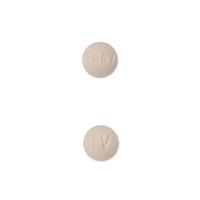Amlodipine / Hydrochlorothiazide / Valsartan Dosage
Medically reviewed by Drugs.com. Last updated on Feb 5, 2025.
Applies to the following strengths: 5 mg-12.5 mg-160 mg; 5 mg-25 mg-160 mg; 10 mg-12.5 mg-160 mg; 10 mg-25 mg-160 mg; 10 mg-25 mg-320 mg
Usual Adult Dose for:
Additional dosage information:
Usual Adult Dose for Hypertension
Initial dose: 1 tablet orally once a day (The dosage may be increased after 2 weeks of therapy. The full blood pressure lowering effect was achieved 2 weeks after being on the maximal dose)
Maximum dose: Amlodipine/hydrochlorothiazide/valsartan 10 mg/25 mg/320 mg orally once a day
Comment:
- Indicated for patients whose blood pressure is adequately controlled on amlodipine, valsartan, and hydrochlorothiazide (as single component formulations or a dual component formulation with a single component formulation). Individual dose titration with each component is recommended before administering the fixed dose combination.
Renal Dose Adjustments
CrCl 30 mL/min or less: Not recommended
CrCl 30 mL/min or more: No adjustment recommended
Liver Dose Adjustments
Amlodipine:
- Exposure to amlodipine is increased in patients with hepatic insufficiency. Lower doses of amlodipine/hydrochlorothiazide/valsartan should be considered.
Valsartan:
- Mild-to-moderate liver disease: No dose adjustment is necessary
- Severe liver disease: Data not available
Hydrochlorothiazide:
- Minor alterations of fluid and electrolyte balance may precipitate hepatic coma in patients with impaired hepatic function or progressive liver disease.
Amlodipine/hydrochlorothiazide/valsartan: Not recommended for initial therapy
- Severe hepatic impairment: Amlodipine/hydrochlorothiazide/valsartan should be avoided in patients with severe hepatic impairment or progressive liver disease, because minor alterations of fluid and electrolyte balance, such as those resulting from diuretic use, may precipitate hepatic coma.
Dose Adjustments
- The full blood pressure lowering effect of amlodipine/hydrochlorothiazide/valsartan is achieved after 2 weeks of therapy on the maximal dose.
- Amlodipine/hydrochlorothiazide/valsartan may be substituted for its individually titrated components for patients on amlodipine, valsartan, and hydrochlorothiazide.
- No initial dosage adjustment of amlodipine/hydrochlorothiazide/valsartan is necessary for elderly patients.
- Use of the maximum dose of amlodipine/hydrochlorothiazide/valsartan of 10 mg/25 mg/320 mg orally once day should be done with particular caution in patients with heart failure and coronary heart disease, and in the elderly aged 65 years or older due to limited experience/data in these patient populations. Frequent monitoring of blood pressure may be required in elderly patients.
Precautions
US BOXED WARNING:
- FETAL TOXICITY: Use of drugs that act on the renin-angiotensin system during the second and third trimesters of pregnancy reduces fetal renal function and increases fetal and neonatal morbidity and death. The resulting oligohydramnios is associated with fetal lung hypoplasia and skeletal deformations. Adverse effects include skull hypoplasia, anuria, hypotension, renal failure, and death. Discontinue amlodipine/hydrochlorothiazide/valsartan as soon as possible if pregnancy is detected. Intrauterine exposure to thiazide diuretics is associated with fetal or neonatal jaundice, thrombocytopenia, and possibly other adverse reactions.
Safety and efficacy have not been established in patients younger than 18 years.
Consult WARNINGS section for additional precautions.
Dialysis
Limited data suggest amlodipine/hydrochlorothiazide/valsartan is only minimally removed by hemodialysis, if at all.
Other Comments
Administration advice:
- Amlodipine/hydrochlorothiazide/valsartan may be used as add-on/switch therapy for patients not adequately controlled on any two of the following antihypertensive classes: calcium channel blockers, angiotensin receptor blockers, and diuretics.
- A patient who experiences dose-limiting adverse reactions to an individual component of amlodipine/hydrochlorothiazide/valsartan may be switched to a lower dose of that component to achieve similar blood pressure reductions.
- Amlodipine/hydrochlorothiazide/valsartan may be taken without regard to food.
Patient advice:
- Advise women not to breastfeed during treatment with this drug.
More about amlodipine / hydrochlorothiazide / valsartan
- Check interactions
- Compare alternatives
- Pricing & coupons
- Reviews (7)
- Drug images
- Side effects
- During pregnancy
- Drug class: miscellaneous antihypertensive combinations
- En español
Patient resources
- Amlodipine, hydrochlorothiazide, and valsartan drug information
- Amlodipine, valsartan, and hydrochlorothiazide (Advanced Reading)
Other brands
Professional resources
Other brands
Related treatment guides
See also:
Further information
Always consult your healthcare provider to ensure the information displayed on this page applies to your personal circumstances.


